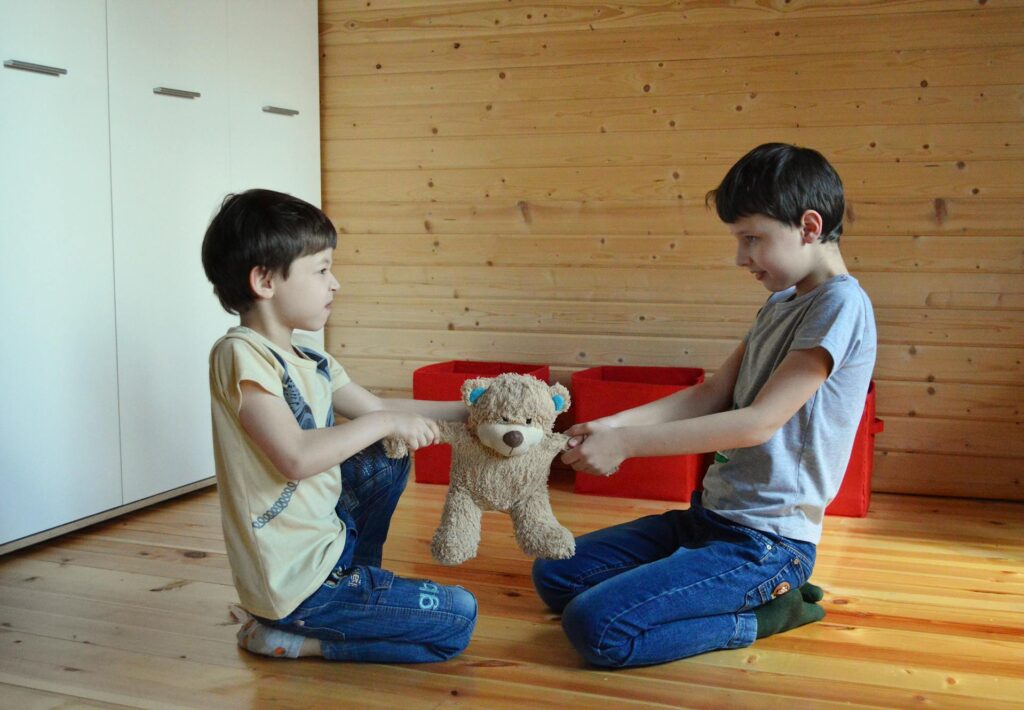
A reader wrote:
I would love it if you could address how parents are supposed to handle children who become unglued and out of control. My family is currently struggling with this issue, and I feel like my child’s behavior is hijacking our peace and scaring his siblings. I’m actively trying to get him help, but so far, we’ve hit roadblocks and are feeling desperate.
I first spoke with his pediatrician, but they dismissed the problem as a parenting issue and suggested more discipline, which felt dismissive and unhelpful. I also approached his school, requesting an assessment for sensory processing disorder (SPD), as many of his meltdowns seem connected to sensory triggers. However, after an initial evaluation, the school concluded he doesn’t require further assessment. While my son is very smart and has high emotional intelligence, he completely unravels at least once a day, if not more. When this happens, everything in the household comes to a halt and it’s extremely distressing for everyone involved.
We’ve considered dietary changes since the longest period of improved behavior coincided with eating whole, minimally processed foods. I’ve also been exploring the Respectful Parenting approach (REI) and reading “No Drama Discipline” to learn better strategies. Despite my efforts, his meltdowns remain severe and disruptive, often lasting up to an hour and a half.
To provide some context, my son is five years old (he’ll turn six in December) and is my second-born child. His meltdowns are intense and characterized by extreme physical outbursts: kicking, screaming, rolling on the ground, and throwing objects. Recently, he’s started scratching himself during these episodes, which is deeply alarming. Attempts to calm him down, such as ignoring, using time-outs, or even holding him, have been largely unsuccessful. When I hold him during a meltdown, he often claws at me or thrashes violently, which is particularly difficult when I’m also holding my baby. Time-outs became a power struggle, and he’s too scared to be left alone. Holding him sometimes escalates the situation, and I worry it might reinforce the behavior. I’ve tried methods I’m not proud of, like spanking, which I’ve since stopped, recognizing its ineffectiveness and harm.
His triggers are numerous and unpredictable. He may melt down if I’m not in bed when he wakes up, if he doesn’t get enough “cuddle time,” if a sibling sits too close to me, or if he’s frustrated by a Lego project. Even minor issues like losing a game, interruptions, or food preparation mistakes can set him off. He’s also highly particular about clothing—what’s uncomfortable one day might be fine months later. On Saturday, he had a meltdown that lasted 45 minutes despite my efforts to acknowledge his feelings and remain calm.
I’m committed to respectful parenting but find it overwhelming, especially since it’s so different from the authoritarian style I grew up with. My parents often resorted to physical discipline, and while I was compliant, I have little positive modeling to draw from. I’m working to overcome my own tendencies, such as yelling and taking his behavior personally, but it’s a constant struggle.
After a meltdown, my son can articulate his feelings remarkably well. He’ll admit he felt out of control and sometimes shares heartbreaking thoughts like, “I feel like you don’t like me” or “don’t want me to be happy.” These moments make me deeply concerned about the potential emotional impact of my parenting missteps and the long-term effects on his well-being.
Thank you for considering my situation. I deeply appreciate any guidance you can offer.
Dear Reader,

My heart goes out to your family. Your poor little guy is obviously hurting, maybe jealous of the attention received by his siblings, and likely taking his pain out on the people and things nearest to him. You and everybody else who is chronically on the receiving end of his outbursts must find that difficult too. I admire that you have not let your lack of having received good parental modeling stop you from putting your all into addressing this problem. I would be very frustrated and almost despairing to try so hard without seeing much positive change yet. However, there is cause for hope. I will get you pointed in the right direction by sharing the relevant points that I have gleaned from my work with children experiencing emotional-behavioral problems like your son’s.
Determining the Treatment Unit
It can be difficult to navigate the mental health system. Some common questions for a parent in your position naturally arise. Who in the family should be the focus of treatment? What kind of treatment will get us unstuck the quickest? Where can I go to get this kind of treatment? In this post, I will go over the benefits of various units of treatment. The unit of treatment is a term used in my profession to denote the configuration of who all attends therapy: this or that individual, group, or subgroup within the family.
The Child-Only Treatment Option
So far, I see that you have tried to get a diagnosis for your son, which perhaps you have done as a first step towards finding individual psychotherapeutic treatment for your son that is specific to his diagnosis. If so, because you have not been able to get a clear diagnosis, I speculate that this might be why you have not proceeded in getting your son into individual therapy yet. I believe that a therapist who uses treatment models that transcend the need for a pre-therapy diagnosis can do relevant, effective therapy with your son now, even without a diagnosis. There are many such models available to a therapist. A few that I use are Oaklander Play Therapy, Mentalization Based Treatment (MBT) for Children, Baars-Terruwe Method, and Counseling with Choice Theory. Getting your son into individual therapy of one or more of these types is one option that can help you to get things moving in the right direction sooner than later.
The Mother-Only Treatment Option
I also see that you have sought help for yourself as an individual by reading about parenting. My field loosely refers to this form of “treatment” as bibliotherapy. While reading parental guidance books can help, it doesn’t always, probably because a general parenting book cannot but fail to grasp the essence of the unique problem with this child. Also, as you have stated, trying to refrain from the bad parenting examples of our parents when we become parents ourselves is often easier said than done. Individual therapy with an emphasis on attachment, trauma, images, bodily sensations, emotions and thoughts can help get things unstuck for you as a parent.
If I was to do individual therapy with you, I would begin by focusing on what was going on with you emotionally when you have acted in ways that you regret as a parent. I use evidence-based methods that, in time, can help a parent to easily stay calm regardless of their child’s misbehavior. Ideally, parents are able to help their children to regulate their emotions. If you can remain calm on the inside and out while setting firm, reasonable boundaries, your child’s “meltdowns” are likely to last less long because he will be more likely to remain calm as he senses your calmness.
When I help a parent to slow down and tune in to what is happening in them when their child chronically, drastically misbehaves, they usually identify a negative belief of “I am not in control” that feels true to them in the moment. Intense fear, anger, or even panic typically accompany the felt-sense of the “truth” of this belief. With the help of my methods, clients typically find that their feeling of not being in control is linked to past traumas that left them feeling powerless. The thoughts and feelings associated with these unresolved traumas are what is called a trauma response. In these cases, the parent’s trauma response makes it nearly impossible for them to remain calm in the face of their child’s misbehavior. To treat the trauma response, I usually use an evidence-based treatment for trauma called EMDR which heals the past trauma, desensitizes the parent’s interior response to their child’s current misbehavior, and helps the parent rehearse staying calm in the face of the future misbehavior of their child. When this treatment is successful, the parent and child will stop escalating conflict and instead respond in healthy and mutually satisfying ways. This new coordination between parent and child is a beautiful thing and moves me every time my clients report on it!
Family Therapy Treatment Options
Other considerations regarding the unit of treatment involve figuring out who might be best to involve in family therapy. Possible useful configurations include: both parents only; both parents and the acting out child only; the acting out child and the parent who gets the worst results when disciplining the child; or the whole family. If the acting out child might try to harm others in session, it is best to not include vulnerable children like your baby in family therapy sessions for the sake of their safety. Now, I will go over the benefits of a couple of these combinations.
Parents-Only Treatment Option
Sometimes one parent gets good results when disciplining an acting out child while the other one does not. There are three main reasons for this dynamic: one parent has a better parenting approach, the parents are not on the same page in their parenting approach, or some conflict between the parents is evident to the child, but the conflict does not have anything to do with parenting. One example of the latter happens when a narcissistic husband treats his wife with arrogance and contempt in front of the child, resulting in the child losing respect for his or her mother. Children see everything, even if they don’t say anything about it. They are sponges that take in everything and imitate what they see. As you know, this is why you are having trouble not copying your parents’ bad parenting habits, but what you might not have realized is that this can also be why an acting out child behaves well for one parent, but not for the other. Regardless of why one parent gets good results when discipling while the other does not, when parents of an acting out child go to family therapy as a unit, treatment by a competent family therapist can be highly beneficial.
The Mother-Acting Out Child or Mother-Baby-Acting Out Child Options

Many times, it is not practical for a father who is the primary income provider for the family to come to family sessions because he may have an inflexible work schedule. In this case, a family therapy treatment unit of mother and the acting out child may be best. If the mother, like you, has a baby as well and it is determined that the baby can be kept safe in a room with the acting out child, it may be necessary to include the baby in family therapy due to the baby’s obvious maternal needs. While the baby will have a passive role in family therapy, as I will explain, its presence can be vastly important.
As you know, your son, like all sons who are properly cared for by their mothers, was your special one, receiving special and focused attention from you after he was born while he was your youngest. This special love that a child receives from the mother helps a child to feel uniquely special and worthy of love, affection, and attention. To feel special in this way is not merely a want, but a true need. This need does not disappear just because a child turns five and his mother has given birth to his new baby sibling. Watching his attention-getting efforts fail, as his mother is understandably distracted taking care of a newborn, can be excruciatingly painful for this no-longer-the-youngest child. What is painful is not merely to not receive the affection and attention that he needs, but his accompanying sense of maternal abandonment, of being alone and feeling no longer uniquely worthy of special attention. He may alternate between internalizing this shame (implosion) and projecting this shame onto others (explosion). It is impossible for a five-year-old to resolve these identity problems alone. He needs much love, compassion, gentleness, understanding and tactfully timed and given guidance to resolve such complex and sticky processes.
So, to have the source of the acting out child’s shame and anger present in the room, that is, to have the mother attending to her baby’s needs in a family therapy session in front of the jealous and acting out child can be very helpful. This setup allows the therapist to see in vivo how the acting out child responds to the mother being unavailable to immediately tend to the acting out child’s needs while she tends to the baby’s needs, which naturally must take precedence. When these three family members are present together in a family therapy session, I will observe, seeking answers to several questions, including: Does the mother notice the acting out child’s vacillating states of shame and anger as they are in their early stages? If so, what does she do in response to them, if anything? What happens with the acting out child after she does nothing or something in response to the acting out child’s shame or anger? Does the mother take the child’s anger personally or does she empathize with the acting out child? If the mother takes the child’s anger personally, what does the acting out child do in response?
By me first noticing these and many other things and then bringing the present family members’ attention to them too, I can begin the process of helping families to see these same things, process them, and change.
The Whole Family Option
While I am happy to treat whichever few family members might be motivated enough or able to show up to therapy, involving the entire family in therapy can provide profound insights and solutions. When all members attend, I can observe otherwise unobservable contributing factors to the acting out child’s misbehavior. While the acting out child might be considered the identified patient and the focus of treatment, the dysfunction of the entire family system is only discernable when all are present.
One of the models I often draw upon in family therapy is Structural Family Systems (SFS). When I am borrowing from SFS therapy, I look for subsystems in the family, that is, groups of alliances and groups that are counter-alliances (Cf. Minuchen, et al, 1967). I look at how these subgroups function, for example: Are they working with the parents to run a smooth ship or are they sabotaging things? If they are mutinous, how do they sabotage things and why? By my careful use of certain SFS techniques, the parents who start out therapy thinking that they merely have a problem child, come to see that there are structures in the family perfectly set up to propel the identified patient into acting out. They come to see that amidst their presenting family structures there is little else for the acting out child to do but alternate between imploding and exploding.
Such an insight is nearly useless if nothing can be done about it. Happily, once dysfunctional family hierarchical structures are seen and their functionality is understood, they can be changed with the assistance of a skillful therapist. There are things that I can do in session and that the family can do at home after sessions to disrupt or break up sabotaging alliances. New, helpful alliances can be created and maintained. The family and I can work together to restructure the family such that the parents lie at the top of the hierarchical structure instead of the acting out child, who often de facto “rules” the family with his aggressive outbursts and intensely despairing implosions.
Thanks to SFS and other techniques, the family can go from a chaotic way of functioning to a reliably intentional one, one that is guided by the parents, involving all subordinate family members who each have clearly identified roles and responsibilities that they accept and embrace. With proper interventions, families can learn to work as a cohesive unit.
Regardless of which family group or subgroup comes to family therapy, a good family therapist who relies on family systems thinking will highlight and intercept dysfunctional family dynamics in the moment as they occur during the session thus helping the family to make lasting, relevant change on the spot. This reality is exciting for me, I never tire of it, and it is one of the favorite parts of my job! What I write here is not a pie-in-the-sky dream, the efficacy of competent family therapy has been reported on in research articles published in peer-reviewed scholarly journals (e.g., Cf. Minuchen, et al, 1967) for several decades now and treatment success is what I have come to expect as the outcome of family therapy.
Summary
In conclusion, the aggressive, sometimes violent, acting out of your son can stop with the help of therapy. Most configurations for the unit of treatment can help: individual therapy for you or your son, or family therapy with whomever you choose to include in it. You can gain the ability to consistently remain calm amidst his acting out. Your emotionally volatile son can learn to collaborate with your intentions instead of rebelling against them regardless of his possible diagnosis. With proper help, in time your family can begin to operate with greater ease.
Thank you for your question. May God bless you and your family with healing and peace.
Blessings,
Thomas Schmierer, LMFT
Healing and Peace
References
Minuchen, S., Montalvo, B., Guerney, B.G., Jr., Rosman, B. L., & Schumer, F. (1967). Families of the slums: An exploration of their structure and treatment. New York: Basic Books, Inc.

Recent Comments